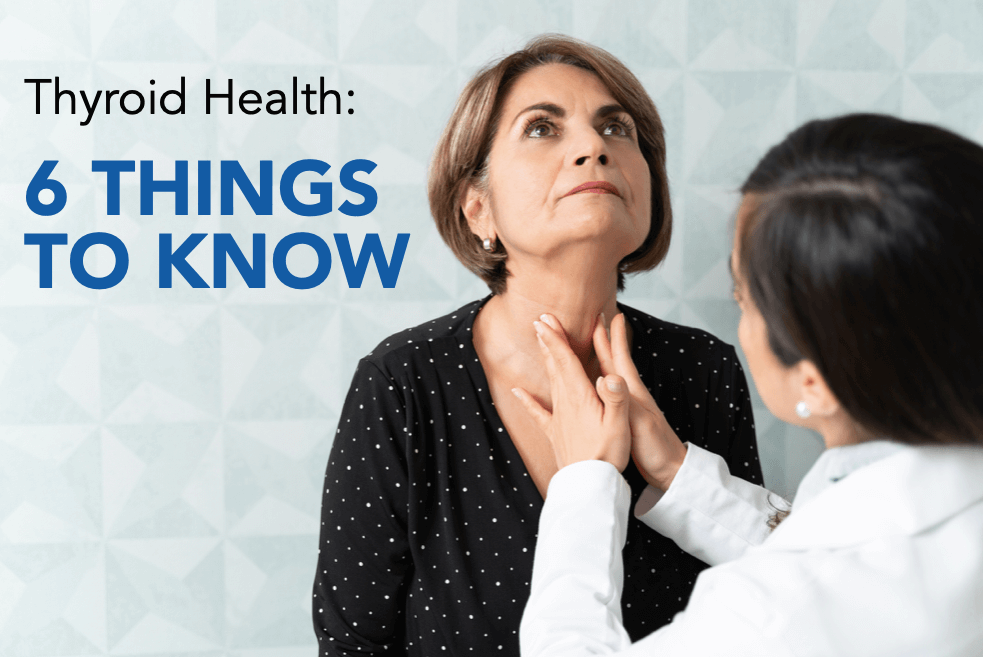
6 Things to Know About Thyroid Health
Life Line Screening makes preventative health screenings easy and convenient so people can understand their risk for developing chronic conditions like thyroid disease before symptoms start. Schedule your screening today.
The thyroid is a small gland located right below your Adam’s apple, shaped kind of like a butterfly. It produces two hormones that regulate your metabolism (the way your body changes food into energy) by telling cells how much energy to use. It’s a seemingly minimal part of your body systems, but if it’s not working properly, it can cause a variety of problems.
The average person typically doesn’t know much about their thyroid and how it works, but it’s important to become familiar with the gland and how it can affect your overall health so you can catch problems early, especially as you age.
Below are six important things to know about thyroid health:
1. There are three primary types of thyroid issues: hyperthyroidism, hypothyroidism, and tumors of the thyroid.
Hyperthyroidism means your thyroid is producing too much of its hormones, and hypothyroidism means it is not producing enough. Tumors of the thyroid, when present, can either be benign modules or malignant cancers.
2. Hyperthyroidism causes your body to use energy too quickly, so symptoms can include fatigue, a faster heartbeat, losing weight without trying, or feeling nervous.
Hyperthyroidism can be caused by a variety of issues, including Graves’ disease, which is characterized by an overactive, enlarged thyroid gland (also called a diffuse toxic goiter). Other causes include overactive nodules within the gland and thyroiditis (the release of hormones stored there), which can be painful or not. Too much iodine in your body can also cause hyperthyroidism, because the thyroid uses the mineral to produce its hormones.
3. Hypothyroidism can make you feel tired, gain weight or even be unable to tolerate cold temperatures.
Hypothyroidism can be caused by an inflamed thyroid gland (also called thyroiditis) or a genetic condition called Hashimoto’s thyroiditis, an autoimmune disease in which the body’s immune system makes antibodies that attack and damage the thyroid, preventing it from producing enough hormones. Also called Hashimoto’s disease, the condition is the most common cause of hypothyroidism, affecting 5 in 100 Americans. It’s at least 8 times more common in women than in men, and it more often appears in women aged 40-60. It may not have any noticeable symptoms at first, but if the thyroid continues to enlarge it can cause a goiter, which can cause a feeling of fullness in the neck but is not typically painful. Other causes of hypothyroidism include postpartum thyroiditis or an iodine deficiency.
4. Women are about 5-8 times more likely to have a thyroid issue than men.
5. Thyroid disease is very common, affecting an estimated 20 million people in the U.S.
6. Risk factors for thyroid disease include:
- Females, particularly over 40
- All adults over 60
- Women who have been pregnant or have delivered a baby within the last six months
- Family history of thyroid disease
- Past treatment for a thyroid problem
- Past neck surgery or radiation
- Pernicious anemia (a vitamin B12 deficiency)
- Type 1 diabetes
- Primary adrenal insufficiency
How is thyroid disease diagnosed?
Thyroid disease can be diagnosed using a simple finger-prick blood test that measures your levels of the thyroid stimulating hormone (TSH), which is actually produced by the pituitary gland. Located in the center of the skull below your brain, the pituitary gland supervises the thyroid by making sure there are enough thyroid hormones in the body. If it senses there are not enough, it can use its own hormone, TSH, to signal the thyroid to produce more.
If your TSH levels are lower than normal, your thyroid may be overactive because the pituitary gland is trying to make up for it. If your TSH levels are high, your thyroid may be underproducing. Learn more about this quick and easy test here.
Tumors of the thyroid are sometimes seen incidentally during a carotid artery screening in the neck.
How is thyroid disease treated?
Hypothyroidism can be treated by replacing your missing hormones with one identical to the one your thyroid should be producing by taking daily medication. This typically solves the issue entirely.
Hyperthyroidism can be treated a few different ways, depending on the severity of your disease. Radioactive iodine can be taken by mouth and absorbed by the thyroid, causing it to shrink. (This can actually cause the thyroid to become underactive, which would then require medication as hypothyroidism, mentioned above.) Anti-thyroid medications can be taken to resolve the issue, sometimes for good. Other options include beta blockers, which ease symptoms but do not actually affect the thyroid, and surgery, particularly for those who cannot or choose not to undergo the previous options, i.e. women who are pregnant.
If you have any questions about thyroid disease or whether or not you should get tested, talk to your doctor or read more about the Thyroid Disease Screening we offer at Life Line Screening.